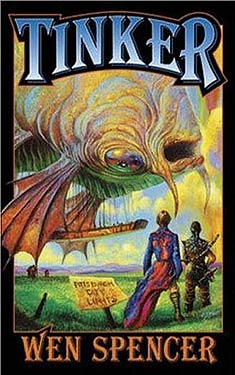Wen Spencer
Completed 4/27/2017 Reviewed 5/4/2017
2 stars
I’m just dying to say “Tinker” is a stinker, but it’s a tad
more complicated. I went in thinking the
book was going to be fluff, but it turned out to be partly fluff, partly really
heavy. Unfortunately, the heavy parts
were taken lightly which I found very disturbing. There’s going to be some spoilers in this
review, so don’t continue if you think you’re going to read it.
 Tinker is a young woman, just turned eighteen, who lives in
Pittsburgh. However, it’s a Pittsburgh
that mainly exists in another dimension.
You see, the Chinese built an interdimensional gateway and they don’t
know exactly how it works. A side effect
is that the city of Pittsburgh spends most of each month in a dimension of
elves and magic and monsters. Once a
month, for a day, it exists back in our dimension in its normal location. Tinker has lived in this travelling
Pittsburgh her whole life, running a junkyard, building contraptions, and just
being brilliant and pretty. Of course,
she doesn’t know just how brilliant or pretty she is, because, well, she’s a
Mary Sue.
Tinker is a young woman, just turned eighteen, who lives in
Pittsburgh. However, it’s a Pittsburgh
that mainly exists in another dimension.
You see, the Chinese built an interdimensional gateway and they don’t
know exactly how it works. A side effect
is that the city of Pittsburgh spends most of each month in a dimension of
elves and magic and monsters. Once a
month, for a day, it exists back in our dimension in its normal location. Tinker has lived in this travelling
Pittsburgh her whole life, running a junkyard, building contraptions, and just
being brilliant and pretty. Of course,
she doesn’t know just how brilliant or pretty she is, because, well, she’s a
Mary Sue.
For those that don’t know, a Mary Sue is a character that is
usually young, pretty, and smart, sort of an idealized and perfect fictioinal
character. Flaws are usually
minimal. Think Wesley Crusher from Star
Trek Next Gen. When this is the main
character, the book can become a bore because the character lacks in
realism.
One day, while being chased by wargs, an elf comes to her
rescue, but is badly injured. In the
process of getting him healed he falls in love with her, though. She’s oblivious to this though does find him exceedingly
attractive. In fact, she’s naïve about
most things. Thus begins a journey which
forces her to confront who she is and where she’s going.
The plots are the subplots, and vice versa. The story is really about who does Tinker
love. The action and everything else are
really the subplots to Tinker’s love life.
It’s sort of the opposite of how most science fiction and fantasy books
work. But even more problematic is the
nature of her love life. It’s full of
non-consensual acts. Okay, two. I think it’s okay to have story lines like
these in a book, but they need to be dealt with in realistic ways. In this book, they don’t have the drama that
comes after the act. It all kind of “goes
away”. In fact, one of the perpetrators
actually disappears from the story. I
have to assume he comes back in a later volume.
I guess what I’m trying to say is that if you’re going to have mature devices,
there has to be a level of maturity to the story. “Tinker” doesn’t have that.
There’s another scene which is pretty horrific that involves
one of the bad characters. Again, it
seems that it just isn’t done well. I
think a good example of how it could be handled well, while still being
deplorable, is in Richard K. Morgan’s The Cold Commands, a dark fantasy where
the lines between good and evil are blurry, and it solidifies the main
character as an anti-hero.
As far as everything else in the book, there are some interesting
characters. I particularly liked Oil-Can,
her cousin. Yeah, the names get to you
after a while. The world building is
pretty good, mixing science and magic.
But again, I’ve seen better mixes of science and magic, for instance,
N.K. Jemisin’s The Fifth Season.
Maybe I’m just over sensitive, or maybe it’s because I was
expecting something different, but I didn’t like this book. The last quarter became a chore to read. I’d like to see how other people respond to
this book. This was a book club
selection, so I’m interested in seeing where the lines are drawn between the
likes and the dislikes. Two out of five
stars.
No comments:
Post a Comment